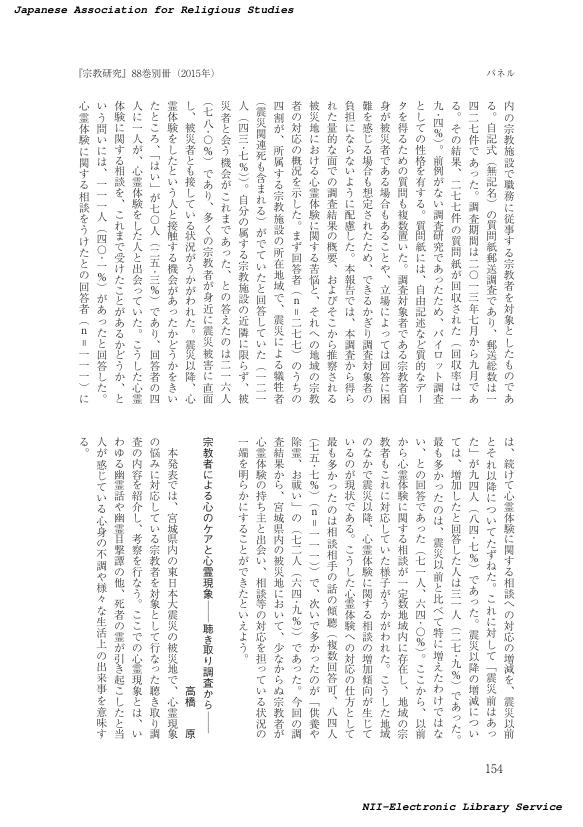- 著者
- 高橋 原
- 出版者
- 日本宗教学会
- 雑誌
- 宗教研究. 別冊 (ISSN:21883858)
- 巻号頁・発行日
- vol.88, pp.154-155, 2015-03-30
7 0 0 0 OA 被災地における「心霊現象」と宗教者の対応(第十二部会,<特集>第72回学術大会紀要)
- 著者
- 高橋 原
- 出版者
- 日本宗教学会
- 雑誌
- 宗教研究. 別冊 (ISSN:21883858)
- 巻号頁・発行日
- vol.87, pp.440-441, 2014-03-30
6 0 0 0 OA ユングの全体性神話と『ゲド戦記』(第一部会,<特集>第六十六回学術大会紀要)
- 著者
- 高橋 原
- 出版者
- 日本宗教学会
- 雑誌
- 宗教研究 (ISSN:03873293)
- 巻号頁・発行日
- vol.81, no.4, pp.939-941, 2008-03-30
4 0 0 0 OA 神話を発展させる : 『ヨブヘの答え』におけるユングのキリスト教再解釈
- 著者
- 高橋 原
- 出版者
- 東京大学文学部宗教学研究室
- 雑誌
- 東京大学宗教学年報 (ISSN:2896400)
- 巻号頁・発行日
- vol.14, pp.111-125, 1997-03-31
Recent research into C. G. Jung has shown that Jung's thought was unique and that Freud's influence was, in fact, not crucial. Jung's thought can best be understood, therefore, in the context of his life as a whole. Drawing from his autobiography and other materials published after his death, we now know that Jung, from childhood, was motivated to integrate his split personality. This split generated his two modes of experiencing religion - traditional Christianity and his particular experience of God - and he felt a tension between the two. Jung's mature thought always focused on Christianity. The "reinterpretation of Christianity" was one of the central themes of his thought, its purpose being the reconciliation between his own psychology and traditional Christianity. The answer had not yet been found in 1912, when his cooperation with Freud came to an end. It seems that the answer instead began to take form in the period between 1913 and 1918, his "critical years" (Homan's term). In this light, the Answer to Job (1952) occupies a special position in Jung's life and work. In that book, I suggest, we can see Jung's "starting point" and "end result" come together. He reinterpreted Christianity and "developed its myth" so as to give a place to his secret experience of God in a Christian context.
4 0 0 0 OA 近年のユング批判の諸相 : 宗教思想としての分析心理学をめぐって
- 著者
- 高橋 原
- 出版者
- 東京大学文学部宗教学研究室
- 雑誌
- 東京大学宗教学年報 (ISSN:2896400)
- 巻号頁・発行日
- vol.22, pp.21-32, 2005-03-31
This essay focuses on some recent criticisms of C. G. Jung's religious thought. Some of them are based on the newly discovered documents and put new light on Jung's thought. Two types of views can be pointed out among the critics ; one considers Jung as a clinical psychologist and another as a religious thinker.Typical Freudian criticism belongs to the former and doesn't find any value in Jung's religious writings ; that is, Jung's religious or theological writings are the results of his childhood psychological problems and/or his break with Freud influenced upon them. Richard Noll's controversial book, Jung Cult, belongs to the latter. According to Noll, Jungian psychology started as a cult whose charismatic leader was Jung himself. In contrast to these critical view, there are certain Jungians who welcome him like a prophet. Edward Edinger is one of such Jungians, who considers Jung's Answer to Job like a holy scripture. So, for the proper understanding of Jung's thought and his influence as a whole, it's important to have a look at the context or constellation of the recent controversy as well as those in Jung's life time.
3 0 0 0 OA 近代日本における知識人宗教運動の言説空間-『新佛教』の思想史・文化史的研究
- 著者
- 吉永 進一 安藤 礼二 岩田 真美 大澤 広嗣 大谷 栄一 岡田 正彦 高橋 原 星野 靖二 守屋 友江 碧海 寿広 江島 尚俊
- 出版者
- 舞鶴工業高等専門学校
- 雑誌
- 基盤研究(B)
- 巻号頁・発行日
- 2008
本研究では、仏教清徒同志会(新仏教徒同志会)とその機関誌『新佛教』に関して、基礎的な伝記資料を収集しつつ、多方面からモノグラフ研究を進めた。それにより、新仏教運動につながる進歩的仏教者の系譜を明らかにし、出版物、ラジオ、演説に依存する宗教運動という性格を分析した。新仏教とその周辺の仏教者によって、仏教の国際化がどう担われていたか、欧米のみならず他のアジア諸国との関係についても論証した。
3 0 0 0 OA 東北被災地域における心霊体験の語りと宗教者による対応に関する宗教学的研究
東日本大震災の被災地において、大量死に直面し悲嘆を抱える人々は様々な形で死者の霊の表象と向き合っており、それが「心霊体験」として表現されたときに、宗教者は地域文化や各宗派の伝統を参照しながら臨機応変に対応していることが明らかになった。本研究ではその対応の特徴として、 (1)受容と傾聴、(2)儀礼の提供、(3) 倫理的教育、(4)自己解決(自然治癒)の了解、という諸点を指摘したが、これは、さまざまな支援者が存在する中で、宗教者が担い得る「心のケア」の特質を考える時に貴重な示唆を与えるものである。
3 0 0 0 OA 宗教概念ならびに宗教研究の普遍性と地域性の相関・相克に関する総合的研究
- 著者
- 池澤 優 近藤 光博 藤原 聖子 島薗 進 市川 裕 矢野 秀武 川瀬 貴也 高橋 原 塩尻 和子 大久保 教宏 鈴木 健郎 鶴岡 賀雄 久保田 浩 林 淳 伊達 聖伸 奥山 倫明 江川 純一 星野 靖二 住家 正芳 井上 まどか 冨澤 かな
- 出版者
- 東京大学
- 雑誌
- 基盤研究(B)
- 巻号頁・発行日
- 2010
本研究は、欧米において成立した近代的宗教概念とそれに基づく宗教研究が、世界各地、特に非欧米社会においてそのまま受容されたのか、それとも各地域独自の宗教伝統に基づく宗教概念と宗教研究が存在しているのかをサーヴェイし、従来宗教学の名で呼ばれてきた普遍的視座とは異なる形態の知が可能であるかどうかを考察した。対象国・地域は日本、中国、韓国、インド、東南アジア、中東イスラーム圏、イスラエル、北米、中南米、ヨーロッパである。
2 0 0 0 OA 誰が話を聴くのか? : 被災地における霊の話と宗教者
In this paper, the author provides an overview of how religious professionals (i.e. Buddhist monks, Christian pastors, etc.) are dealing with socalled occult phenomena in the tsunami stricken areas after the Great East Japan Earthquake. Most of the ghost tales seem to result from a variety of unconscious anxieties but there are no professional support workers available for people to consult with about them other than religious people, especially Buddhist monks. Furthermore, even these religious people do not necessarily have any particular prescription that has been prepared by their sect or denomination to deal with such tales. However, this could be an advantage for them from the viewpoint of spiritual care, because it makes it possible for them to listen in an open and frank manner, and with an unbiased view to these stories.The main characteristics of the care provided by such religious professionals is that they aim not only at removing troubling symptoms as medical doctors do, but also aim for creating a better quality of life for people by restoring their views of life and the world. The experts do this through conducting religious ceremonies intended to bring peace to the restless souls of the dead. Even if they believe that the “true” cause of occult phenomena is some secular anxiety, they deal with these phenomena as religious or spiritual issues instead of reducing them to secular matters to be resolved by secular means. This is why religious people can take a unique role among caregivers and it is of importance to reconsider the role of the religious professionals as social capital.
1 0 0 0 資料 井上哲次郎の「比較宗教及東洋哲学」講義--解説と翻刻(1)
- 著者
- 磯前 順一 高橋 原
- 出版者
- 東京大学史史料室
- 雑誌
- 東京大学史紀要 (ISSN:03867684)
- 巻号頁・発行日
- no.21, pp.1-55, 2003-03
- 著者
- 高橋 原
- 出版者
- 日本宗教学会
- 雑誌
- 宗教研究 (ISSN:03873293)
- 巻号頁・発行日
- vol.88, no.Suppl, pp.154-155, 2015-03-30 (Released:2017-07-14)
- 著者
- 高橋 原
- 出版者
- 日本宗教学会
- 雑誌
- 宗教研究 (ISSN:03873293)
- 巻号頁・発行日
- vol.81, no.3, pp.732-738, 2007-12-30




